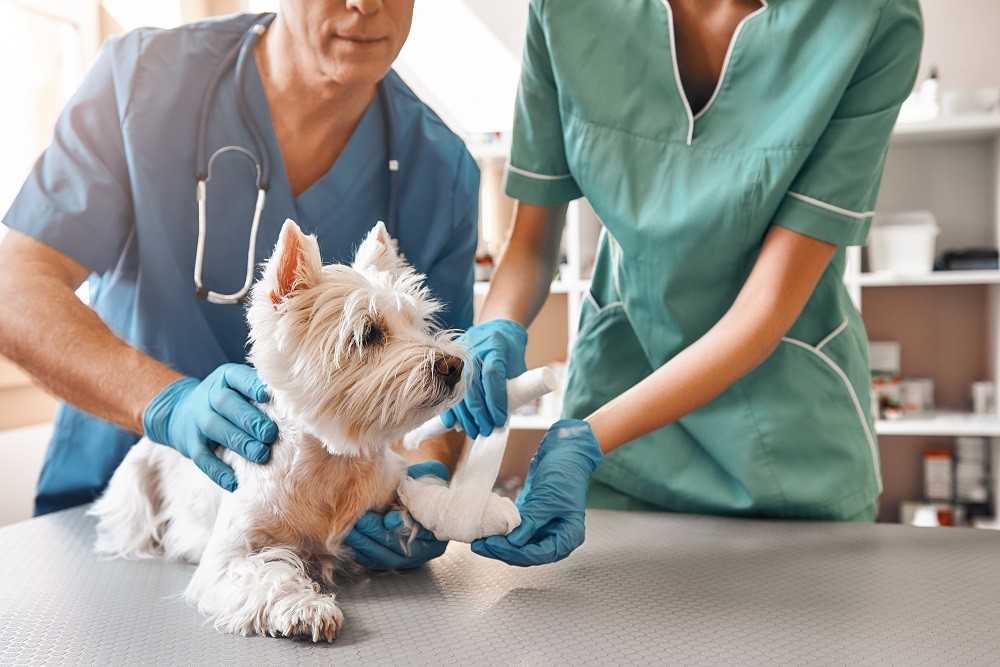If you are advised to go to the emergency clinic, be prepared for potentially long wait times.
![]()

Dr. Jeanne Haggerty-Arcay

Dr. Jeanne Haggerty-Arcay
During the past couple of years the veterinary field has reached a crisis point. An increase in demand for services with widespread staffing shortages has led to long waits for routine appointments and even longer waits for emergency care. It can often be difficult for pet owners to determine when they can hold out for an appointment and when it is time to head off to the emergency clinic. Although many cases may fall into a gray area, there are times when a trip to the ER is warranted.
Seizures: A pet with a new onset of seizures should be evaluated. This is particularly true of a puppy/kitten, pets who have sustained trauma and animals who may have ingested any type of toxins.
Intractable Vomiting: Although a single or even a couple episodes of vomiting may not necessarily be an indicator of a serious condition, intractable or prolonged vomiting should be investigated. It can often be the result of infectious diseases such as parvo in puppies, foreign body ingestion, pancreatitis or other systemic disease which may require intervention.
In addition, pets with frequent vomiting (especially young or very small animals) can become dehydrated quickly and lose the ability to regulate their blood sugar.
 Sick Puppies/Kittens: Very young animals who have become ill often deteriorate rapidly, especially if they are not eating or drinking. Regardless of the cause, they often require some type of treatment in order to keep them out of a medical crisis.
Sick Puppies/Kittens: Very young animals who have become ill often deteriorate rapidly, especially if they are not eating or drinking. Regardless of the cause, they often require some type of treatment in order to keep them out of a medical crisis.
Traumas: Pets who have sustained serious trauma should be evaluated. Adrenaline released immediately after a trauma can mask symptoms and these animals can often have internal injuries that may not be initially appreciated.
Eye Injuries: The severity of an eye issue can be difficult to assess by many pet owners. Eye injuries, scratches and foxtails can worsen rapidly if not treated and can result in loss of vision or loss of the eye.
Breathing Difficulty: Difficulty breathing is a medical emergency and should be evaluated.
Toxin Ingestion: If you know or suspect that your pet has ingested something toxic, you should seek emergency care. Time is of the essence; in many cases vomiting can be induced before a toxin has the chance to be absorbed. Common toxins include: medications, rodent bait and cleaning agents. You should always bring with you the medication bottle/name or the package from any toxin.
 If your veterinarian is open, call for advice on how to proceed. If you are advised to go to the emergency clinic, be prepared for potentially long wait times. Wait times can vary and may be as long as six to eight hours. Be sure to bring a form of payment to the emergency clinic as most (if not all) will ask for full payment at the time of service. If your pet is on any chronic medications, bring a list of those medications or simply bring the bottles. If you know that you will be heading to the ER with a serious, life-threatening emergency that will require immediate care, call first or on your way so they can prepare for your arrival.
If your veterinarian is open, call for advice on how to proceed. If you are advised to go to the emergency clinic, be prepared for potentially long wait times. Wait times can vary and may be as long as six to eight hours. Be sure to bring a form of payment to the emergency clinic as most (if not all) will ask for full payment at the time of service. If your pet is on any chronic medications, bring a list of those medications or simply bring the bottles. If you know that you will be heading to the ER with a serious, life-threatening emergency that will require immediate care, call first or on your way so they can prepare for your arrival.
Be patient. If you are waiting, it is likely because the staff is treating something more serious. If your pet comes in requiring immediate life-saving measures, you would want them treated as soon as possible. Emergency wait times can be frustrating. But remember that if you are waiting, there is likely another pet worse off than yours who is being treated.






